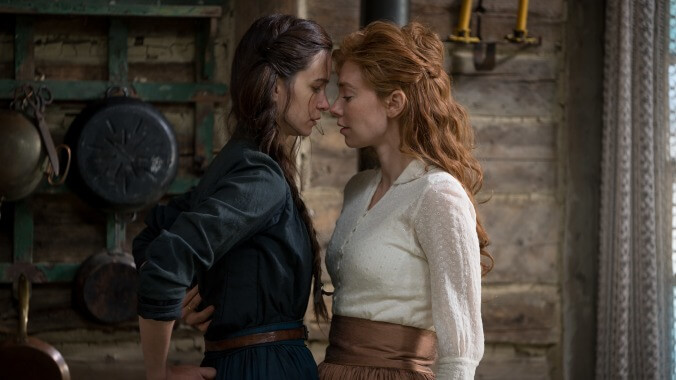For thousands of years, the promise of heaven has been dangled in front of the downtrodden as an incentive not to question their lot. But Abigail (Katherine Waterston), a frontier housewife in upstate New York circa 1851, no longer clings to such a dubious comfort, as she writes in her diary in the opening scenes of
The World To Come. One of those newfangled educated women, Abigail doesn’t attend church (or really read her Bible all that much), instead keeping a daily journal of her grief and misery while longing for an atlas—about as convenient a metaphor for escape as there is. This hunger, the feeling of one’s heart beating against one’s chest so hard you fear it may burst out and fly away, is supposed to be the driving force behind director Mona Fastvold’s entry into the flourishing subgenre of period lesbian romance. But in the end, it’s the anguish
behind the daydream that lingers as the credits roll.
One thing this film does well is capture the monotony and grim slog of pioneer life—the death, despair, and cold weather that have robbed Abigail and her husband, Dyer (Casey Affleck), of their will to do anything besides merely survive. Based on a story by Jim Shepard, who’s adapted it himself with the help of novelist Ron Hansen (The Assassination Of Jesse James By The Coward Robert Ford), The World To Come differs from the recent Portrait Of A Lady On Fire and Ammonite in that it treats husbands as something more than obstacles to the women’s happiness—at least in the case of Abigail and Dyer, who still share some tenderness beneath grief over the loss of their only child.
Their new neighbors, Tallie (Vanessa Kirby) and Finney (Christopher Abbott), on the other hand, have no love left between them, if there was ever any at all. A free-spirited redhead who chafes under her husband’s tyrannical religiosity, Tallie makes an immediate impression on Abigail, who writes an awestruck entry in her journal about the gorgeous woman who’s just rented the farm next door. Tallie is drawn to Abigail, too, and as the two grow closer and the tension between them escalates, so does Finney’s physical and psychological abuse of his wife. Eventually, both explode, leading to a prolonged, stodgily paced denouement that brings these frontier dreamers back to harsh reality.
The World To Come is in love with language, constructing palaces of beautiful words that contrast with the muddy, rocky environment surrounding its characters. (Sure, you get the occasional gorgeous vista, but the film’s natural beauty is much like Abigail and Tallie’s desires: just out of reach.) Much of this dialogue comes from Waterston, not only in the film’s pervasive—and sometimes oppressive—voiceover, but also in her lengthy conversations with Tallie as the two enjoy each other while their husbands are out working the farm. Their attraction seems more intellectual than physical, which keeps the film’s romantic energy at a lukewarm simmer throughout.
Part of this can be chalked up to the overall formality of the piece, and part of it to the stiff chemistry between Waterston and Kirby, who are more believable in the hesitant early stages than after they’re consumed with ardor. Fastvold also chooses to withhold the film’s more explicit sexuality until long after Abigail and Tallie’s furtive afternoons together have ended—a decision that, along with keeping the worst of Finney’s violence toward Tallie off screen, further places tangible human physicality at a remove. Daniel Blumberg’s odd, experimental score, more effective at conveying stinging ice whipping faces than a tender moment between lovers, adds to the alienation. Yes, this is ultimately a tragic story of squashed passions and dreams deferred. But the disappointing irony of Casey Affleck—a man twice sued for sexual harassment—giving the most soulful performance in a film about women in love cannot be overstated.


